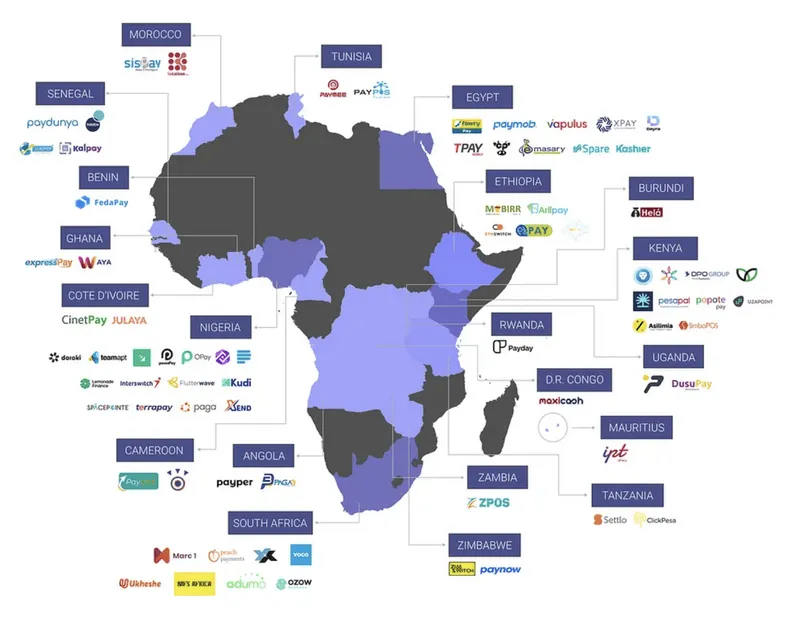Key Trends Shaping African Fintech

The African fintech landscape in 2024 was marked by both challenges and opportunities, underscoring the sector’s resilience and adaptability. From deepening integrations across industries to navigating funding slowdowns, African innovators showcased their ability to turn obstacles into growth opportunities. Here are the standout trends that defined the year:
1. Embedded Fintech as the Future
In 2024, embedded finance firmly established itself as a transformative force across industries in Africa. Fintech solutions moved beyond traditional applications, weaving seamlessly into sectors like healthcare, education, utilities, and trade. Retailers and non-fintech businesses embraced embedded finance to offer financial services directly through their platforms, enhancing user experiences and creating new revenue streams.
2. Mobile Money: Still the Backbone
Mobile money continued to lead the charge in financial inclusion. With improved cross-border payment systems and better accessibility for underserved populations, the platform’s dominance remained unmatched. Solutions addressing remittances and merchant payments cemented mobile money’s place as an essential service for millions across the continent.
3. Diversified Funding Amidst VC Slowdown
Venture capital funding experienced a significant decline, but startups adapted by exploring alternative financing routes. Debt financing became more affordable and accessible, while government initiatives like the $1 billion Timbuktoo Initiative provided a lifeline to innovative businesses. Angel investors, corporate VCs, and accelerators also stepped in, ensuring that funding streams, though restructured, stayed open.
4. Blockchain Innovations and Crypto Growth
Blockchain technology saw broader adoption, powering solutions in supply chain management and digital identity verification. Cryptocurrency gained traction for remittances, P2P transactions, and trade finance, despite global skepticism. Africa led the charge in showcasing impactful, everyday use cases for crypto, positioning itself as a hub for blockchain-driven innovation.
5. Market Consolidation Reshaping the Landscape
The year saw an increase in mergers and acquisitions, fueled by the need to consolidate resources and enhance profitability. From horizontal synergies like Wasoko and MaxAB to vertical integrations such as Chipper Cash‘s move into digital ID services, these partnerships redefined market dynamics. Many smaller startups gracefully exited by merging with better-funded counterparts, ensuring continuity in services and growth.
6. Generative AI’s Impact on Financial Services
Artificial intelligence played a pivotal role in 2024, particularly generative AI. Fintechs leveraged AI to create personalized financial products, automate customer support, and streamline operations. Applications in diagnostics, smart farming, and climate tech also highlighted AI’s potential beyond fintech, further enriching Africa’s tech ecosystem.
7. Green Fintech and ClimateTech Innovations
Fintech solutions addressing climate challenges emerged strongly. As African countries navigated sustainability goals post-COP28, startups developed tools to unlock carbon credit funding and support green finance initiatives. These solutions bridged the gap between climate action and financial inclusion, ensuring environmental and economic benefits went hand in hand.
8. Fintech Expanding Beyond Borders
Global expansion became a key strategy for African startups. Success stories like Flutterwave’s foray into India and TymeBank’s Southeast Asia ventures highlighted the ambition and capability of African fintechs to scale internationally. This trend underscored the continent’s readiness to contribute to and compete in the global tech ecosystem.
9. Resilience Through Efficiency
Startups learned hard lessons from the funding crunch of 2023, prioritizing positive unit economics and controlled burn rates. Those that emerged stronger in 2024 embraced a “cash is king” philosophy, focusing on profitability and sustainability over rapid growth. This shift brought greater stability to the ecosystem, setting the stage for long-term success.
10. AfCFTA Driving Intra-African Trade
The African Continental Free Trade Area (AfCFTA) initiative accelerated cross-border trade. With interoperable payment systems like PAPSS enabling instant settlement in local currencies, intra-African trade became more efficient. This development fostered greater economic collaboration and reduced reliance on foreign exchange markets.
A Resilient Future
While 2024 tested the tenacity of African fintech players, the sector proved its mettle by leveraging innovation and collaboration. Fintech founders demonstrated leadership by navigating political, reputational, and financial challenges, ensuring their ventures thrived amidst uncertainty.
The progress made in 2024 reaffirms Africa’s position as a global fintech leader. The ecosystem continues to mature, driven by a shared vision of financial inclusion, technological innovation, and economic empowerment.









